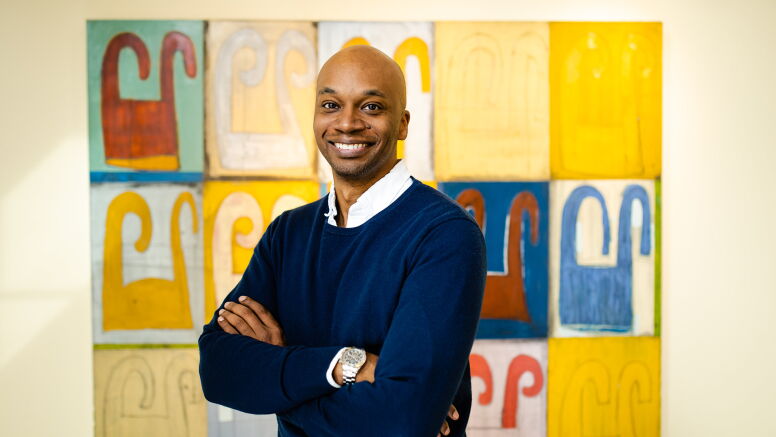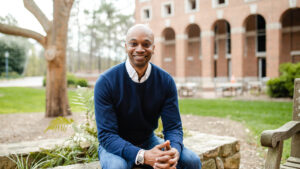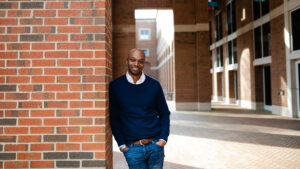News & Stories
Creating diverse and inclusive workforces

The issue of racial inequality rose rapidly up the corporate agenda following the murder of George Floyd and global Black Lives Matter protests. And the earnest statements of intent by company bosses around the world to stand against racism were music to the ears of Khalil Smith (MBA ’13).
He has made it his mission to encourage a more representative workforce and improve the inclusion of different ethnicities, genders and backgrounds.
He leads the development of Akamai Technology’s industry-leading culture of inclusion, diversity and employee engagement. He is a vice president at the company, which has about 10,000 people globally.
“You might have not heard the name but have had experiences with us,” Smith says. “We do a lot of content distribution on the internet, so on any given day about 40% of the world’s internet traffic is running through Akamai servers. If you’ve ever streamed Disney Plus, watched the World Cup or used a Peloton, you’ve probably benefited from our services.”
As an African American with a Latina wife and two interracial children, the racial injustice personally affect Smith.
“I have two sons who are trying to navigate this world, and I certainly worry about both their opportunities and their safety.
And while the increased awareness of racial justice is a positive development that is long overdue, he wants words to be followed by action.
“Just to be outraged is not enough,” he says. “What we need to do is fundamentally change the systems in place that have led to this movement. Let’s go beyond the rhetoric and get to the details. We’ve seen and heard promises from companies about investment of money, time and resources, but those commitments haven’t consistently turned into results or persevering once the spotlight is no longer shining.”
That is Smith’s specialty: He has advised dozens of leading companies on how to create a more diverse and inclusive workforce.
 “Being inclusive is about pulling apart unconscious bias, stimulating employee engagement and advocacy,” he says. “It can create opportunities for people that otherwise would not have them while simultaneously creating a better experience for those in the majority. This work isn’t a zero-sum game.”
“Being inclusive is about pulling apart unconscious bias, stimulating employee engagement and advocacy,” he says. “It can create opportunities for people that otherwise would not have them while simultaneously creating a better experience for those in the majority. This work isn’t a zero-sum game.”
Smith led teams in one of Apple’s first retail stores. This seeded his transition to the corporate side of the business, where he led important elements of the training and development of Apple’s 60,000-plus retail employees.
“My task was to ensure the culture in the Apple store in New York was similar enough to Paris or Barcelona, but still with a local flavor,” Smith says. The stores, with their glass walls and wooden tables, are now iconic and among the most profitable in the world.
His role also involved helping to launch the Apple Watch — a top-secret project. “We taught tens of thousands of employees how to create an entirely new customer experience that is more hands-on than buying an iPhone,” he says.
A decade of hard work helped cement Smith’s reputation inside Apple, but “outside the company no one knew my name,” he says.
So, he sought an MBA to raise his credibility on the job market. And he was sold on UNC Kenan-Flagler’s culture of collaboration.
“I wasn’t going to have to compete against my classmates. I would compete with them,” he says.
Smith was distinctive for not having a bachelor’s degree. College graduation wasn’t an option; he married his high school sweetheart and they had their first child when they were relatively young.
He praises Anne-Marie Summers, the now-retired director of the Weekend Executive MBA Program, for taking a chance on him and offering him a place at UNC Kenan-Flagler.
 “For a lot of schools, my background was a non-starter,” says Khalil. “UNC Kenan-Flagler was a place willing and able to see beyond my background. They saw the potential that I saw in myself.”
“For a lot of schools, my background was a non-starter,” says Khalil. “UNC Kenan-Flagler was a place willing and able to see beyond my background. They saw the potential that I saw in myself.”
He brought his experience at Apple to bear in the MBA program, enriching classroom discussions with his perspective on the company, which was enjoying a breakout year in 2012 when its revenue and stock soared to new heights.
“I was going through the program when Apple was at the top of the world,” Smith says. “Every fifth article or business book was about Apple. I was passionate about the company and it helped push the discourse forward.”
The experience boosted his confidence, improved his quantitative skills and gave him a global network of like-minded peers who voted for him to deliver their commencement address in 2013.
He continued to work at Apple before taking the drastic step to leave after 14 years at the company to create his own consulting firm in 2016.
“If you erase the MBA from my history, I doubt I would have had the confidence to walk away from a company at the top of its game, a very good salary, bonuses, and stock options,” he says. “The MBA from Chapel Hill made me much more willing and able to gamble on myself.”
He helped small- and medium-sized firms to improve their learning and development programs — an experience that sparked a passion for marrying social psychology, behavioral economics and business management.
That new focus led him to turn down a job offer at a top consulting firm because “the predictability of going back to a large organization didn’t appeal to me,” he says.
Instead he joined the NeuroLeadership Institute (NLI), which uses neuroscience to help make companies more human through science. The firm wanted Smith, an effective communicator, to expand its diversity and inclusion practice and become a vocal force for positive change in the business world.
He built its diversity and inclusion practice while serving as vice president of research, practices and consulting. He was responsible for strategy and market presence for the consulting firm, which had offices in New York, London and Sydney.
“I wanted to become a bigger fish in a smaller pond and help transform the working culture of large organizations,” he says.
He joined Akamai in 2020 and is based from home in Chapel Hill. The company offers a suite of cloud computing, security and content delivery services to global companies. The cybersecurity division works with “governments and banking institutions, for instance, to help keep us safe and secure from bots and scammers and all sorts of folks who have nefarious goals online.”
He’s also changing organizations through his writing. He shares his ideas and expertise in his articles published in Forbes, strategy+business, Quartz, Harvard Business Review, Business Insider, and in an interview on National Public Radio.
Smith has supported UNC Kenan-Flagler with its diversity and inclusion initiatives. He advised the Undergraduate Business Program on how to improve Black engagement in the community and build an even stronger community.
“We did work to maximize the inclusion across a pretty diverse group – people coming from different backgrounds and different scenarios and different points of view, and dealing with some of the challenges of psychological safety around how you show up. Do I feel respected? Do I feel like people can hear me, do I feel appreciated? And how does all of that manifest in my day to day?”
“Universities, not just at Chapel Hill, have great academic research on diversity and inclusion, yet they often don’t practice what they preach,” he says. “They need to harness that intent and think deeply about building systems to create more opportunities for traditionally underrepresented groups.”
He is passionate about giving back to the Business School that has given so much to him, he says. “I can’t think of a better way to use the skills I’ve gained than to give back to such a storied and important institution.”
Smith loves the work he’s doing. As he thinks about how to continue to make a lasting impact, he is considering future opportunities, such as an advisory role in government.
“Potentially, I could help a candidate do great work, pass great legislation and have a positive impact on the world.”